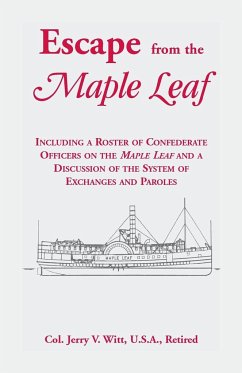"The seizure of the Maple Leaf has been given almost no attention because of its relative unimportance in comparison with other events occurring shortly before and after; the escape of seventy Rebel officers was but a minor footnote to a calamitous war filled with disasters. The day before the escape from the Maple Leaf, the largest cavalry battle of the war was fought at Brandy Station. And within a few weeks after the prisoners' return, devastating blows would be delivered to the South at Vicksburg, Port Hudson, and Gettysburg. These are but some of the reasons by the events of June 10, 1863 on the Maple Leaf have been eclipsed and all but forgotten." The Confederate officers involved in the Maple Leaf escape thought that they were on their way to City Point, Virginia, to be exchanged for Union prisoners. Soon after their arrival at Fort Norfolk, however, the prisoners were told exchanges and paroles had been suspended, and that they would be transported on the Maple Leaf to the Federal prison at Fort Delaware. Once at sea, they began plotting their escape. Off the coast of Virginia, they were able to overwhelm their captors, and went ashore in North Carolina a few miles south of Cape Henry. Country folk risked their lives assisting the escapees as they fled across the Great Dismal Swamp with the Yankees close behind. Colonel Witt retired after thirty years in the U.S. Army where he served as Staff Judge Advocate in Vietnam and Germany, as well as at West Point, and the U.S. Army Training and Doctrine Command at Fort Monroe, Virginia. He also served tours of duty in the Pentagon as legislative counsel in the Office of the Secretary of the Army, and as Deputy Legal Advisor to the Chairman, Joint Chiefs of Staff. At the time of his retirement he was responsible for the supervision and training of the Army's 200 criminal defense attorneys.
Bitte wählen Sie Ihr Anliegen aus.
Rechnungen
Retourenschein anfordern
Bestellstatus
Storno








